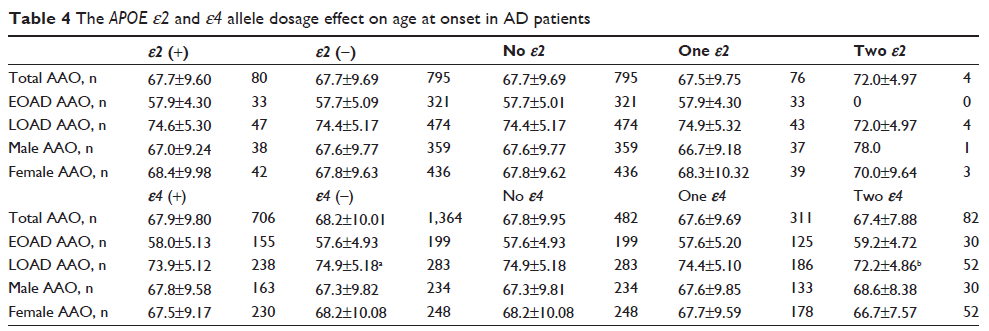108384
论文已发表
注册即可获取德孚的最新动态
IF 收录期刊
- 3.4 Breast Cancer (Dove Med Press)
- 3.2 Clin Epidemiol
- 2.6 Cancer Manag Res
- 2.9 Infect Drug Resist
- 3.7 Clin Interv Aging
- 5.1 Drug Des Dev Ther
- 3.1 Int J Chronic Obstr
- 6.6 Int J Nanomed
- 2.6 Int J Women's Health
- 2.9 Neuropsych Dis Treat
- 2.8 OncoTargets Ther
- 2.0 Patient Prefer Adher
- 2.2 Ther Clin Risk Manag
- 2.5 J Pain Res
- 3.0 Diabet Metab Synd Ob
- 3.2 Psychol Res Behav Ma
- 3.4 Nat Sci Sleep
- 1.8 Pharmgenomics Pers Med
- 2.0 Risk Manag Healthc Policy
- 4.1 J Inflamm Res
- 2.0 Int J Gen Med
- 3.4 J Hepatocell Carcinoma
- 3.0 J Asthma Allergy
- 2.2 Clin Cosmet Investig Dermatol
- 2.4 J Multidiscip Healthc

已发表论文
载脂蛋白 E 基因多态性与广大中国汉族人口中患阿尔茨海默病的风险之间的关联
Authors Wu P, Li HL, Liu ZJ, Tao QQ, Xu M, Guo QH, Hong Z, Sun YM
Published Date January 2015 Volume 2015:10 Pages 371—378
DOI http://dx.doi.org/10.2147/CIA.S73396
Received 28 August 2014, Accepted 3 November 2014, Published 30 January 2015
Objective: Apolipoprotein E gene (APOE )
polymorphisms contributing to the risk of sporadic Alzheimer’s disease (AD)
have been identified for decades, but it has not been investigated in large AD
samples of Chinese Han population.
Methods: We performed a cross-sectional study to explore the effect of APOE polymorphisms on sporadic AD in 875 sporadic AD patients and 1,195 cognitive normal controls of Chinese Han. Genotyping of APOE was determined by multiplex amplification refractory mutation system polymerase chain reaction.
Results: APOE ε3ε4 and ε4ε4 genotypes increased AD risk with dosage effect. The odds ratio (OR) of ε3ε4 was 1.89 and the OR of ε4ε4 was 15.64 compared with that of ε3ε3 in all the subjects. E2ε3 genotype decreased AD risk in all the subjects (OR=0.64), female subgroup (OR=0.57), and late-onset AD subgroup (OR=0.60). However, neither ε2ε2 nor ε2ε4 affected AD risk. About the age at onset (AAO), the influence of APOE ε4 was only exhibited in late-onset AD subgroup, with 1 year lower in ε4 -positive ones than negative ones. Further analysis did not show the dosage effect of ε4 pertinent to AAO, though the AAO of ε4ε4 patients decreased by 2 years. E2 did not affect the AAO of AD.
Conclusion: APOE ε4 is a strong risk factor of AD risk in Chinese Han population, and APOE ε4ε4 genotype might be related to the AAO of late-onset AD.
Keywords: sporadic, cross sectional study, dosage effect, age at onset
Methods: We performed a cross-sectional study to explore the effect of APOE polymorphisms on sporadic AD in 875 sporadic AD patients and 1,195 cognitive normal controls of Chinese Han. Genotyping of APOE was determined by multiplex amplification refractory mutation system polymerase chain reaction.
Results: APOE ε3ε4 and ε4ε4 genotypes increased AD risk with dosage effect. The odds ratio (OR) of ε3ε4 was 1.89 and the OR of ε4ε4 was 15.64 compared with that of ε3ε3 in all the subjects. E2ε3 genotype decreased AD risk in all the subjects (OR=0.64), female subgroup (OR=0.57), and late-onset AD subgroup (OR=0.60). However, neither ε2ε2 nor ε2ε4 affected AD risk. About the age at onset (AAO), the influence of APOE ε4 was only exhibited in late-onset AD subgroup, with 1 year lower in ε4 -positive ones than negative ones. Further analysis did not show the dosage effect of ε4 pertinent to AAO, though the AAO of ε4ε4 patients decreased by 2 years. E2 did not affect the AAO of AD.
Conclusion: APOE ε4 is a strong risk factor of AD risk in Chinese Han population, and APOE ε4ε4 genotype might be related to the AAO of late-onset AD.
Keywords: sporadic, cross sectional study, dosage effect, age at onset
